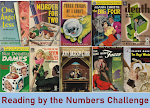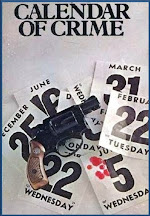
Every year I look forward to the local Red Cross Book Sale. They boast over 80,000 titles as available. Well, I didn't actually take time to count, but I'd say there were at least that many--if not more. And, no, I didn't bring them all home with me. I didn't have time. I made a mad dash to the Fairgrounds after work and had less than an hour to work my way through as many sections as I could before they started herding us out the door. So, I only managed to snag 23 books. But, no worries, I'm going back tomorrow when I can browse at a more leisurely pace. Here's what I've brought home so far....
Murder Has Its Points by Richard & Frances Lockridge (the Lockridge books are always on my TBO--To Be Owned List). Still need about 20 titles before the collection will be complete.
The Dreadful Hollow by Nicholas Blake
Wycliffe & the Guilt Edged Alibi by W. J. Burley
Murder Down Under by Arthur W. Upfield
Anatomy of a Murder by Robert Traver (Dell Pocket 1st edition in the pocket size! This was an up-grade for me. I previously had a pretty rotten copy of the 2nd edition of the pocket size.)
Call for Michael Shayne by Brett Halliday (Dell Pocket 1st edition)
She Woke to Darkness by Brett Halliday (Dell Pocket 1st edition)
The Case of Jennie Brice by Mary Roberts Rinehart
The Gay Phoenix by Michael Innes
Champagne for One by Rex Stout
The Coffin Tree by Gwendoline Butler
The Religious Body by Catherine Aird (have read, but always wanted to own)
Murder in the Dark by Margaret Atwood
The Fifth Man by Manning Coles
Black Widow by Patrick Quentin
Two Men in Twenty by Maurice Procter
The Doorbell Rang by Rex Stout
Watson's Choice by Gladys Mitchell (another that I've read but wanted to own)
C. B. Greenfield: A Little Madness by Lucille Kallen
Frenchman's Creek by Daphne du Maurier
Five Passengers from Lisbon/Wake for a Lady/The Murder in the Stork Club by Mignon G. Eberhart/H. W. Roden/Vera Caspary (3-in-1 book club edition--bought purely for the Caspary portion, but I'll certainly check out the others)
Strange Murders at Greystones by Elsie N Wright (in the clearance section & I couldn't resist even though I know nothing about Wright)
Crime & Mr. Campion by Margery Allingham




























































